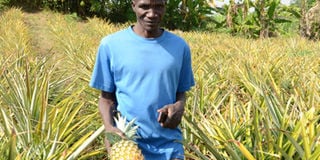Ojulong’s organic pineapples pay off

Ojulongo in his pineapple garden. The farmer harvests about 600 fruits per week which he sells in Kayunga town. PHOTO BY GEORGE KATONGOLE
The late morning sun is searing as Seeds of Gold team visits James Ojulong’s pineapple farm in Kitimbwa Sub-county, Bisaka village in Kayunga District.
We find the 32-year-old father of eight on the farm harvesting a section of the fruits as he walks around checking on others.
His two acres host 30,000 fruits of the crop that he has farmed for the last 19 years after quitting banana and maize farming.
Ojulong who is one of the farmers supported by aBi says he quit maize farming due to poor payments that did not match his investment into the crop.
Game changer
Pineapples have, therefore, been a source of his livelihood since then. “Pineapples washed away the pain I got from maize. I earn up to Shs200,000 a week and harvest throughout the year save during cold season,” he says, adding he sells a fruit from Shs2,000 to Shs5,000 depending on the size. The farmer further sells pineapple seedlings, which he propagates, at Shs700 each.
He propagates the seedlings from the crown by removing the lower leaves, then storing them until they are dry and start to produce roots.
Best practices
The ideal soil pH for the crop is between four and seven, which is the case in Kayunga and Luweero. Favourable altitudes range from 600 to 1, 800 metres above sea level. “I plant the seedlings in 5-10cm deep hole, spaced at 30 by 60cm. I then mulch the crops with dry grass to reduce evaporation.
Later, I add compost manure to boost nutrients, especially if leaves have a reddish, purple tinge indicating that the crop is starving,” says Ojulong, noting the fruits should not be closer to one another to prevent competition for nutrients and enable easy management. Harvesting is twice per year and it goes on for three months.
Constant supply of manure
“The fruits do not ripen at once and on average, I can harvest a third of the total population of the fruits, getting from 400 to 600 fruits per week,” says Ojulong, who plants the fruits in different portions to enable him harvest them round the year. His pineapples are of smooth cayenne variety, which he sourced from a single planting material from a fellow farmer and has propagated all his current plants from it.
Going at the market place in search for customers is not his trend as they come to his farm. However, one of his major challenges is theft of his fruits. Moses Mukasa, an agricultural crop officer in Kayunga, says an acre hosts from 18,000 and 21,000 fruits with a farmer earning Shs7.2m during first harvest.
“As the harvesting season advances, the prices and income increases by half,” he says, adding that for nutrition, the fruits require at least 15 tonnes of organic manure.
In addition, it is important to apply 150kg CAN fertiliser per acre when top dressing and foliar when it’s not raining since it is soluble and is absorbed through the leaves.
He advises farmers to feed the fruits with little water because if well-planted and mulched, the fruit recycles its own water. “For the pineapple to root, it takes about one to three months but to test the progress you can tug the crown to see if the fruit is taking hold in the soil,” he says, adding one must not pull too hard to break the root. He observes that mono-cropping can be done for an average of eight years without posing danger to the crops planted. However, during the period, there should be constant supply of manure to replenish nutrients in the soil.
Management
Weeding starts right after two weeks of planting. The farmer says it is imperative to manage the weeds. A month later, Ojulong purchases coffee husks of about Shs200,000. Coffee husks supplement other fertilisers.
About aBi
Agricultural Business Initiative (aBi) was jointly founded by the Governments of Denmark and Uganda in 2010.
It is a social enterprise that channels development cooperation funding to agribusinesses and agricultural service providers in Uganda with the aim of building a competitive, profitable and sustainable agriculture and agribusiness sector in support of equitable wealth creation in Uganda. It currently comprises of aBi Development (formerly aBi Trust) and aBi Finance.
Since inception, aBi has channelled development funding as matching grants and business development services to agricultural producers and agribusiness enterprises to enhance their management, production, productivity, value addition, income, profitability and employment. This is done for six value chains: coffee, cereals, pulses, oil seeds, horticulture and dairy.
aBi has also supported enhancement of financial services for agribusiness by providing liquidity, de-risking instruments and technical assistance to Financial Institutions. aBi is funded by Denmark (DINIDA), Sweden (SIDA) and USA (USAID).




